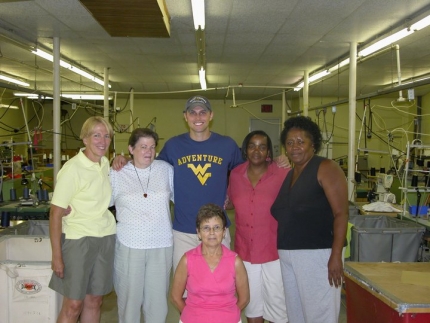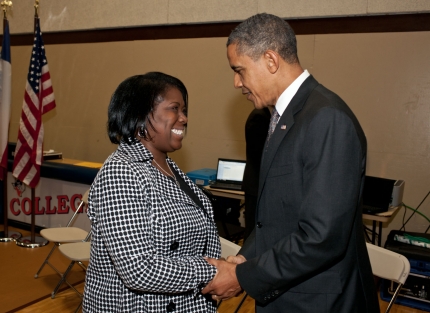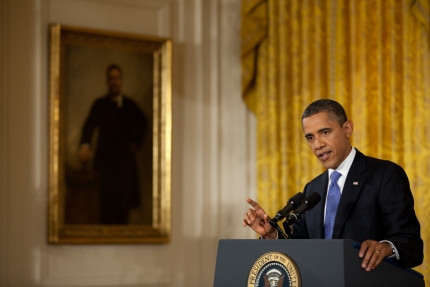Jobs News
Putting Americans Back to Work with the American Jobs Act
Posted by on October 11, 2011 at 9:00 PM EST
Every day, President Obama reads ten letters from the public in order to stay in tune with America's issues and concerns. One recent one came from Alice Johnson of Oregon who, along with her husband, has been looking for a job for about two years. Last week, President Obama described Johnson's letter in his Weekly Address:
She writes, “I have faithfully applied for work every week…Of the hundreds of applications I have put in, I received interview requests for about 10…I too, am sick of all the fighting in Washington DC. Please tell the Republicans that people are hurting and are hungry and need help, pass the jobs bill.” Alice Johnson needs our help.
After working hard her whole life and playing by the rules, Johnson is one of the millions of Americans who have been affected by the recession through no fault of their own. "I'm an honest, loyal, dependable person who has always worked," Johnson said. She knows there are many others going through the same experience.
The American Jobs Act will help create job opportunities for people like Johnson by providing a $4,000 tax credit to employers for hiring long-term unemployed workers. The Jobs Act will also prohibit employers from discriminating against unemployed workers when hiring.
Learn more about EconomyAviation Entrepreneur Says American Jobs Act Is "Critically Important" to Small Firms
Posted by on October 11, 2011 at 8:00 PM ESTJamail Larkins wants Congress to pass the American Jobs Act so he can reduce his payroll expenses and put more people to work. "The Jobs Act is critically important to small firms like mine. One of our biggest expenses is payroll, and the ability to reduce our payroll taxes will allow us to hire more people by stretching our limited capital."
Larkins, 27, is the President and CEO of Ascension Aircraft, an airplane sales and leasing company in Augusta, Georgia that he founded in 2006. This entrepreneur's love of flying began the first time he piloted a plane -- at the age of twelve. He continued taking lessons, but his decision to volunteer to wash planes at his local airport helped him establish relationships with pilots and more quickly gain confidence in his flying abilities. Eventually Larkins petitioned the Federal Aviation Administration to allow him to fly solo before his 16th birthday. Though his exemption was denied, he was undeterred and traveled to Canada, where the minimum age to fly solo was fourteen. That year, Larkins became one of the youngest American pilots to solo a powered aircraft in Canada. “I was fortunate that I discovered my calling in life at a young age. Flying a small aircraft is a very unique experience. It’s challenging, it’s exciting, always changing, and it allows you to see the world from a completely different perspective.”
Learn more about , , Economy, Foreign PolicyThe American Jobs Act Supports Jobs for Veterans
Posted by on October 11, 2011 at 7:02 PM EST
Iraq veteran Joe Kidd said one of the hardest parts of coming home was finding a job. After two deployments in Iraq, the first in 2007 and again in 2009, Kidd was appointed to the emergency room at Camp Lejeune and later became the Leading Petty Officer, managing about forty people. Yet, like many veterans, Kidd found it was difficult for potential employers to understand his experience, making finding a job outside of the service a challenge.
“I had forty people underneath me and then I got out in April, you know thinking, hey some of this should transfer, but no nothing really transferred. That’s pretty much been the hardest thing, knowing that nothing transfers….employers don’t understand military jobs”
Last month when Kidd heard President Obama introduce the American Jobs Act from the First Lady's box at a joint session of Congress, he was heartened to hear that it included a call for ensuring we have a career-ready military. Both sides of Congress stood in support as President Obama spoke about our national obligation to help veterans find jobs:
Pass this jobs bill, and companies will get extra tax credits if they hire America’s veterans. We ask these men and women to leave their careers, leave their families, risk their lives to fight for our country. The last thing they should have to do is fight for a job when they come home.
The American Jobs Act includes tax credits to encourage businesses to hire unemployed veterans and that makes sense to Kidd. "Hiring a veteran is one of the most patriotic things you can do," Kidd said. And with the American Jobs Act there is an added incentive.
Businesses that hire veterans who have been unemployed six months or longer would receive a tax credit up to $5,600, and that credit rises to $9,600 for veterans who also have service-connected disabilities. That is why President Obama is urging Congress to pass the Jobs Act right away.
President Obama Attends Meeting of Council on Jobs and Competitiveness
Posted by on October 11, 2011 at 5:55 PM ESTPresident Obama today attended a meeting of his Council on Jobs and Competitiveness, where he heard recommendations from the group on how to get the economy moving and create more jobs. The advisory council, which includes leaders from business, labor and academia, was created by the President earlier this year to provide diverse perspectives and ideas on how to create jobs and strengthen our competitiveness.
The third quarterly meeting of the Council today in Pittsburgh was focused on a report that team presented to the President that offered five major initiatives to increase employment while improving competitiveness:
- Measures to accelerate investment into job-rich projects in infrastructure and energy development
- A comprehensive drive to ignite entrepreneurship and accelerate the number and scale of young, small businesses and high-growth firms that produce an outsized share of America’s new jobs
- A national investment initiative to boost jobs-creating inward investment in the United States, both from global firms headquartered elsewhere and from multinational corporations headquartered here
- Ideas to simplify regulatory review and streamline project approvals to accelerate jobs and growth;
- Steps to ensure America has the talent in place to fill existing job openings as well as to boost future job creation.
Learn more about EconomyHigh Tech Manufacturers See American Jobs Act "Creating Opportunities at Every Turn"
Posted by on October 11, 2011 at 5:45 PM ESTWendy Jameson, the co-founder of ColnaTec in Gilbert, Arizona says that the American Jobs Act will enable her company to "concentrate on what we do best – putting Americans and American innovation to work. Every dollar saved by the American Jobs Act is one more dollar we can spend on innovation. This changes the growth trajectory of our company, creating opportunities at every turn. In these difficult times, with most Americans worried about what tomorrow holds, who wouldn’t want that?"
Jameson and Scott Grimshaw’s “green tech” manufacturing business lives up to its founders' motto: “fear mediocrity.” Since its launch in October 2009, ColnaTec has become one of the world’s only firms that makes the electronic sensors needed to manufacture thin film solar cells and display screens used in devices such as cell phones. The holder of numerous patents, ColnaTec has received two research grants from the Department of Energy for a new self-cleaning sensor, which will not only be more accurate than existing models, but also capable of clearing off the coating that forms on them, which leads to sensor failure – a process Grimshaw has said will work like a “self-cleaning oven.”
The co-founders, who met on Twitter, say “can’t” is a word they don’t believe in. Jameson, who has 25 years experience in sales, marketing and business strategy is the CEO, and Grimshaw, the founder of two other high tech manufacturing businesses, is the chief technology officer. Their business (which is named after Jameson's sons, Colton and Nathan) is self-funded, and the owners say their aim is to develop manufacturing products that haven’t existed before – designing those products for long life and the highest accuracy and efficiency possible.
Learn more about EconomyPassing the American Jobs Act is "Common Sense"
Posted by on October 11, 2011 at 3:22 PM EST
Last month, President Obama introduced the American Jobs Act, a plan to to put more people back to work and put more money in the pockets of working Americans, to a special joint session of Congress. Marlena Clark from Maryland watched the President's address from the First Lady's box as a guest of Dr. Jill Biden. When asked what she thought of the President's plan, Clark said, "passing the jobs bill is just common sense."
A couple years ago, Clark was working multiple minimum wage jobs, including cleaning houses, to put herself through school so she would have a chance at a brighter future. The first person in her family to go to college, she attended her local community college where she was involved in a mentoring program focused on retaining women in IT careers and had an internship at a local IT company. Now a graduate of Anne Arundel Community College (AACC), Clark is working as a full-time systems engineer at the company where she interned, supporting the sales team and customers with networking solutions.
Clark plans to continue her education and get a bachelor's degree and she knows the American Jobs Act would help her reach her goal. The Jobs Act, which will cut payroll taxes in half next year for 160 million workers, will make her goal more affordable: The typical American family will take home an additional $1,500 in 2012 if this tax cut is approved.
Clark explained why she believes it is so important to pass the American Jobs Act, "the same struggles I went through are what so many other Americans are going through...all of us are going to benefit from it. I hope they go ahead and pass this jobs bill because people need jobs now."
See how the American Jobs Act will impact others:
What do teachers think of the American Jobs Act?
Manufacturer hopes to expand and hire through the American Jobs Act.
How the American Jobs Act will help pay for education
How small business owners will be affected by the American Jobs Act
Tax savings created by the American Jobs Act
What the American Jobs Act means for high tech manufacturers
American Jobs Act creating jobs for veterans
Creating more jobs for small firms
Putting the unemployed back to work
How the American Jobs Act will impact familiesSee what mayors are saying about the American Jobs Act
Learn more about EconomyRestaurant Entrepreneur Says American Jobs Act Will Help Small Businesses Get Back on Track
Posted by on October 11, 2011 at 11:07 AM ESTPhilip Maung, founder and CEO of Hissho Sushi, believes that Congress should pass the American Jobs Act so that small businesses like his can fast track their growth. “The American Jobs Act has provisions that will motivate small businesses owners like me to expand in an environment in which we have been forced to put some hiring decisions on hold for quite some time. Hopefully, with these incentives, small businesses will get back on track and our company, along with many other companies, can continue in our role of being the driving engine behind job growth.”
Maung arrived in this Los Angeles from Burma in 1989 with $13 in his pocket. He had a dream of making something of himself and wanted to make his family proud. In 1998, Maung and his wife started Hissho Sushi in their dining room. What began as a tiny company providing fresh sushi to supermarkets and cafes has evolved into a dynamic foodservice and distribution enterprise, headquartered in Charlotte, North Carolina. Hissho Sushi now employs more than 200 people and trains sushi chefs, distributes sushi ingredients throughout the United States and operates more than 400 sushi bars across the country.
Learn more about EconomyAmerican Jobs Act Would Help Hard Working Families Pay for Education
Posted by on October 11, 2011 at 10:00 AM EST
Sabrina Mangrum works hard as a student teacher in Maryland, and even harder at home, where she and her husband are raising six children, aged two-25. Sabrina and Dannie, who has been a corrections officer for 17 years, are hoping Congress passes the American Jobs Act, because the extra money in every paycheck will enable them to put something aside for their children’ educations.
Education is extremely important to the Mangrum family, who are in the process of adopting the three children they have been fostering through Lutheran Social Services of the National Capital Area. “All of my heart and mind are focused on giving them a better life,” says Sabrina Mangrum. The extra money is not about luxuries in this family, but the chance to have something left over, some money to spend taking the children to museums and to places where they can expand their worldview.
“We are teaching our children the difference between wants and needs,” she said. The payroll tax holiday that is central to President Obama’s plan to put workers back on the job and put more money in the pockets of working Americans would offer a cushion to the Mangrum family. “Now it’s all hustle and bustle to make ends meet, we would be able to more easily enjoy life with additional funds – bring home, do what’s necessary and have some left over.”
Learn more about EconomyCutting Red Tape to Help Create Jobs
Posted by on October 11, 2011 at 8:56 AM ESTToday, as President Obama meets with his Council on Jobs and Competitiveness in Pittsburgh, Pennsylvania, the Administration is announcing the selection of 14 infrastructure projects around the country that will be expedited through permitting and environmental review processes. This is an important next step in the Administration’s efforts to improve the efficiency of federal reviews needed to help job-creating infrastructure projects move as quickly as possible from the drawing board to completion. And it’s just one example of the President’s commitment to cutting red tape to help create jobs – the lessons we learn from expediting these projects will help us reform and improve the permitting and review process in the future.
Today’s announcement comes as a result of the Presidential Memorandum President Obama issued in late August at the recommendation of the Council on Jobs and Competitiveness.Through the Presidential Memorandum, the President directed agencies to expedite environmental reviews and permit decisions for a selection of high priority infrastructure projects that will create a significant number of jobs, have already identified necessary funding, and where the significant steps remaining before construction are within the control and jurisdiction of the federal government and can be completed within 18 months. The projects the agencies chose represent diverse sectors of the economy and combined will support the creation of tens of thousands of jobs.
Improving the federal government’s permitting and environmental review process is one of several areas where the Administration has made strides implementing the Jobs Council’s recommendations and promoting job growth. From helping small businesses grow, to bolstering travel and tourism to the U.S., to cutting through regulatory red tape, the Administration has aggressively promoted job growth in line with the Jobs Council recommendations. For example, by accelerating payments from federal agencies to small business government contractors, we’re getting money into the hands of small businesses faster so they can reinvest that money in the economy and drive job growth. We are also streamlining existing regulations, with a priority on implementing changes that benefit small businesses and spur job growth.
Learn more about EconomyClothing Manufacturer Says the American Jobs Act "Will Change the Global Scope of Apparel Manufacturing"
Posted by on October 11, 2011 at 6:00 AM ESTThe payroll tax holiday on all new hires and wage increases that is part of the American Jobs Act will help Chris Yura of SustainU and his manufacturing partners in West Virginia, North Carolina and Tennessee "free up much needed capital to continue growing in our community and in other areas of the country as we look to expand."
Yura is especially drawn to the tax credits for hiring the long-term unemployed and for hiring service-disabled veterans that are provision of the American Jobs Act. “The growth and potential of our business lies solely in our American contracted manufacturers. Giving our partners in manufacturing the ability to rehire skilled workers increases our productivity and will change the global scope of apparel manufacturing. We have the people that want and need jobs; we need to invest in them.”
When Yura was a fullback for Notre Dame, he wore his Fighting Irish uniform with great pride. Yura recognized the power of the school’s signature apparel by the excitement generated in the stands when they took the field, and saw “The Shirt” bring people together even far from the college stadium. After graduating in 2003, Yura spent five years modeling in New York City where he became particularly interested in the sustainable fashion movement and was frustrated to learn about the misleading character of the “green” clothing movement.
Learn more about EconomyTexas Teacher Hopes Congress Passes the American Jobs Act So She Can Return to the Classroom
Posted by on October 11, 2011 at 5:00 AM ESTKimberly Russell was laid off in May of this year. She was teaching Social Studies and Economics at Lincoln High School in Dallas, both standard and AP classes. Unbeknownst to Russell, her position was being paid by federal stimulus funding and the funding was exhausted. Like many other educators, Russell has a family. She is a single mother of a 10 year old son, and she prides herself on being a homeowner. Now that she is unemployed, Russell is struggling to keep that dream of homeownership alive. Russell is hoping that Congress will pass the American Jobs Act to help teachers get back to work soon. She misses her students and wants to get back in the classroom.
Russell introduced President Obama last week at an event in Mesquite, Texas where he toured a pre-school before talking about the impact the American Jobs Act will have on schools, and on teachers, across the country. He told the crowd there that the stakes for addressing this situation are high, with “nothing less than our ability to compete in this 21st century economy” at risk.
And Russell points out additional long term consequences of taking teachers like her out of the classroom. “My school is in one of the worst socio-economic districts in Texas. It takes a different kind of person to build a rapport with those kids, it is a hard school to staff. And my heart fills when I think of those kids, and then it breaks when I remember that I was trying to show those children that they could change their situation through education, they could get out and do something. This makes me look like a hypocrite – look, she’s got an education and she lost her job anyway. I hope they still value the lessons I tried to drive home to them.”
Economists: The President’s Plan Will Create Jobs Now, The GOP’s Won’t
Posted by on October 7, 2011 at 11:18 AM ESTYesterday, the President held a press conference and once again urged Congress to pass the American Jobs Act to jumpstart the economy and put the American people back to work. There’s no question that the American Jobs Act will put more money in the pockets of working Americans, get police officers, teachers and firefighters back to work and put construction workers back on the job rebuilding our crumbling roads and bridges. These are the steps we must take to get our economy moving again.
But don’t take our word for it. Prominent, independent experts have confirmed that the American Jobs Act will materially improve economic growth and employment next year. For example, Moody’s Mark Zandi released a report stating that “The plan would add 2 percentage points to GDP growth next year, add 1.9 million jobs, and cut the unemployment rate by a percentage point.” Macroeconomic Advisers estimated that it would increase growth by 1.3%, and result in 1.3 million more jobs in 2012. The President has proposed a plan. It’s been assessed and reviewed by independent experts.
But what do those same independent experts say about the Republican’s plan? According to an article in the New York Times this morning, Macroeconomic Advisers chairman Joel Prakken said their plan “would have little immediate effect relative to a plan that stimulates aggregate demand.” Moody’s Mark Zandi said the Republicans' ideas “won’t mean much for the economy and job market in the next year,” even as he said “it is vital for Congress and the administration to provide some near-term support to the economy.”
The Republican plan won’t create jobs in the short term. The American Jobs Act is made up of the kind of ideas that both Republicans and Democrats have supported in the past. There’s simply no excuse for them sitting on the sidelines while teachers are being laid off in droves and construction workers are out of a job. It’s time for Republicans to stop playing politics and pass this bill.
Learn more about EconomyThe Employment Situation in September
Posted by on October 7, 2011 at 8:52 AM ESTToday’s employment report shows that private sector payrolls increased by 137,000 and overall payroll employment rose by 103,000 in September. The unemployment rate remained unchanged at 9.1 percent, a level that is unacceptably high. Despite a slowdown in economic growth from substantial headwinds experienced throughout the year, the economy has added private sector jobs for 19 straight months, for a total of 2.6 million jobs over that period.
Clearly, we need faster economic growth to put Americans back to work. Today’s report underscores the President’s call for Congress to pass the American Jobs Act to put more money in the pockets of working and middle class families; to make it easier for small businesses to hire workers; to keep teachers in the classroom; to put construction crews to work rebuilding our nation’s infrastructure; and other measures that will help the economy grow while not adding to the deficit over ten years.
Learn more about EconomyWest Wing Week: "Why Is that White House Pink?"
Posted by on October 6, 2011 at 11:00 PM ESTWelcome to the West Wing Week, your guide to everything that's happening at 1600 Pennsylvania Ave. This week, the President continued to call on Congress to pass the American Jobs Act, welcomed a new Chairman of the Joint Chiefs of Staff, spoke at the Human Rights Campaign annual dinner, hosted a Cabinet meeting, traveled to Texas and convened a televised news conference. That's September 30th to October 6th or "Why Is that White House Pink?"
President Obama: Our Economy Really Needs a Jolt Right Now
Posted by on October 6, 2011 at 5:46 PM ESTPresident Obama held a press conference today to talk about the American Jobs Act and the upcoming Senate vote on his plan to put people back to work and put more money in the pockets of working Americans.
Before taking questions from the reporters who were gathered in the White House, the President talked about the very real danger that fallout from the economic situation in Europe could further jeopardize our own economic recovery:
This is not a game; this is not the time for the usual political gridlock. The problems Europe is having today could have a very real effect on our economy at a time when it’s already fragile. But this jobs bill can help guard against another downturn if the situation in Europe gets any worse. It will boost economic growth; it will put people back to work.
And by the way, this is not just my belief. This is what independent economists have said -- not politicians, not just people in my administration. Independent experts who do this for a living have said this jobs bill will have a significant effect for our economy and for middle-class families all across America. And what these independent experts have also said is that if we don’t act, the opposite will be true. There will be fewer jobs; there will be weaker growth.
Learn more about EconomyImproving Public Safety and Creating Jobs for Law Enforcement
Posted by on October 6, 2011 at 11:21 AM ESTEd. Note: Cross posted with the Department of Justice Blog.
Yesterday, along with COPS Director Barney Melekian, I traveled to Cincinnati, Ohio, to discuss the Justice Department’s most recent efforts to support our nation’s law enforcement community – and to ensure that police officers from coast to coast have the resources that they need and deserve.
In recent years, police departments like Cincinnati’s – and law enforcement agencies nationwide – have faced extraordinary budget difficulties and have been asked to do more with less. All across the country, law enforcement officials have risen to the challenge – and found innovative, collaborative ways to improve public safety and to keep crime trends heading in the right direction. But at a time when approximately 10,000 officer jobs have been cut, and three times as many positions are currently unfilled due to fiscal constraints, we have a looming national crisis on our hands, both in terms of public safety and public employment. In short, our citizens need protection – and our police officers and other first responders need jobs.
As part of the Department’s ongoing effort to meet these needs, I’m proud to report that the COPS Office is providing more than $240 million in new grants to support the hiring and retention of more than 1,000 officers in nearly 240 agencies and municipalities across the country. The Cincinnati Police Department alone was awarded more than $6.8 million in grant money from the COPS Hiring Program, which will fund 25 critical positions for three years.
Learn more about Economy, Homeland SecurityAmerican Transportation Built by American Workers
Posted by on October 5, 2011 at 10:18 AM ESTEd. Note: Cross-posted from Fast Lane, the blog of the Secretary of Transportation.
Earlier this week, President Obama called on Congress to recognize the needs of unemployed Americans by taking up the American Jobs Act this month.
I was reminded of my trip to St. Paul, MN, where I saw the progress being made on the Central Corridor Light Rail Line, which will connect St. Paul and Minneapolis. That project is expected to create 3,300 jobs – and that doesn’t even include the local businesses that will benefit from being located near the line’s 18 new stations.
We're talking about American transportation, built by American workers, and strengthening an American city. It can and should be a model for the rest of the country. And that's why I'm so excited about the American Jobs Act.
Learn more about EconomyPresident Obama: American Jobs Act Will Prevent Up to 280,000 Teachers from Losing their Jobs
Posted by on October 4, 2011 at 5:58 PM ESTThe White House today released a report that outlines the devastating impact the recession has had on schools and students across the country. Teacher Jobs at Risk highlights the significant cuts in education spending that have resulted from state budget shortfalls since 2008, including the loss of nearly 300,000 teaching jobs across the country (see chart below).
And in the coming school year, without additional support, many school districts will have to make another round of difficult decisions. As a result of state and local funding cuts, as many as 280,000 teacher jobs could be at risk. Unless they receive federal assistance, many school districts will be forced to reduce the number of teachers in their classrooms, or turn to other measures such as shortening the school year or cutting spending on schoolbooks and supplies.
President Obama, speaking today in Texas, compared the situation here with South Korea, where their President said they can’t hire teachers fast enough:
“They call them “nation builders” -- that’s what they call teachers in Korea, “nation builders,” because they know that educating their children is the best way to make sure their economy is growing, make sure that good jobs are locating there, making sure they’ve got the scientists and the engineers and the technicians who can build things and ship them all around the world. That’s what he understands. And the whole country supports him. Here in America, we’re laying off teachers in droves. It makes no sense. It has to stop. It has to stop.”
The President was at Eastfield Community College, in Mesquite, Texas where he toured a pre-school before talking about the impact the American Jobs Act will have on schools, and on teachers, across the country. He told the crowd there that the stakes for addressing this situation are high, with “nothing less than our ability to compete in this 21st century economy” at risk.
This is why one of the central components of the American Jobs Act, which the President introduced last month at a Joint Session of Congress, is funding to avoid and reverse teacher layoffs now, and to provide support for the re-hiring and hiring of educators.
Specifically, the American Jobs Act will invest $30 billion to support state and local efforts to retain, rehire, and hire early childhood, elementary, and secondary educators. If enacted, these teacher stabilization funds would help prevent layoffs and support the hiring or re-hiring of nearly 400,000 educators, includ¬ing teachers, guidance counselors, classroom assistants, afterschool personnel, tutors, and literacy and math coaches. These funds will ensure that schools are able to keep teachers in the classroom, preserve or extend the regular school day and school year, and maintain important afterschool activities.
Trade Agreements Will Help Create Export-Supported Jobs in America
Posted by on October 4, 2011 at 4:45 PM ESTEvery day, President Obama is fighting to put more Americans back to work. That’s why he proposed the American Jobs Act – a package of bipartisan, common sense measures designed to help U.S. businesses grow and create jobs – which Congress should pass right away.
Yesterday, the President took another step to help create and preserve U.S. jobs when he sent Congress three trade agreements,with Korea, Colombia, and Panama. President Obama is calling on Congress to pass the trade agreements and at the same time to renew Trade Adjustment Assistance (TAA) that helps workers whose jobs are affected by global competition. All four of these items are important elements of the President’s balanced trade agenda to open markets for U.S. exporters and keep faith with workers here at home.
Together, these agreements are estimated to increase U.S. GDP by more than $12 billion and support tens of thousands of additional American jobs. In fact, it is estimated that every $1 billion of goods and services we export supports approximately 5,500 jobs at home. That means the Korea trade agreement will support at least an estimated 70,000 U.S. jobs through increased goods exports alone.
Naturally, the big job-building potential of these agreements has led many Americans to ask how increased trade translates into more U.S. jobs. The short answer is that trade agreements open overseas markets to significantly enhance opportunities for American businesses and workers to sell more innovative, high-quality products Made in America to customers all around the world. And as American exporters expand their businesses by increasing international sales into these newly-opened markets, they are likely to hire more workers to produce goods and provide services here at home.
These agreements will make it cheaper, faster, and easier for U.S. producers to sell more American goods and services in the growing markets of Korea, Colombia and Panama. They will put American businesses, workers, farmers, ranchers, manufacturers and service providers on a level playing field against foreign competitors.
For example, today, there are plenty of Hyundais and Kias on American highways, because car customers here in the United States have the freedom to choose among many different brands and models at competitive prices. In contrast, there aren’t nearly as many Fords, Chevys, or Chryslers cruising the streets of Korea, in part because high tariff and non-tariff barriers currently put U.S. auto manufacturers at a disadvantage in the South Korean market.
Seizing sales opportunities overseas can build jobs and businesses of all sizes throughout the American automotive supply chain here at home. That’s why, last year, President Obama sent a team back to the negotiating table to secure additional market access and a level playing field for U.S. auto manufacturers in Korea. Now there are more export opportunities – and more potential jobs – on the table in the U.S.-Korea trade agreement. Similarly, the Colombia and Panama trade agreements will enhance job-building export opportunities for U.S. producers.
President Obama wants to turn these trade opportunities into real jobs and more money for American working families. Now’s it’s up to Congress to act by passing the trade agreements and renewing TAA. By coming together to find common ground on a balanced approach to trade, we can get our economy moving full speed ahead with more jobs for hard-working Americans.
Learn more about , , Economy, Foreign PolicyGeorgia Teen Hopes American Jobs Act Is Passed
Posted by on October 4, 2011 at 1:09 PM ESTDestiny Wheeler wants Congress to pass the American Jobs Act now. The 16-year-old wrote to President Obama last month, and explained that the rough economy was making it “hard to see myself pushing forward and putting my family in a better position.”
The President was moved by the Georgia high school junior’s plea, and referenced her letter in his October 1 weekly address. In it, Destiny wrote about her fears that despite her hard work, the caliber of her education will seem “trivial” compared to her peers in other countries. “The American Jobs Act,” she wrote “gives me hope that I might start to receive a better education, that one day job opportunities will be open for me to grasp and that one day my personal American Dream will be reached.”
In a follow-up conversation, Destiny said it wasn’t just concern for her own future that compelled her to write to the President for the first time, but the Jobs Acts’ emphasis on modernizing schools across the country. “I am mostly focused on what I see in other schools. In some schools there will be tons of students and only 3 computers and one of them doesn’t even work. You modernize schools and you help kids move forward.” Her own school, Destiny said, does have enough computers for students to use in class.
President Obama is well aware of the negative effects the economy is having on our students. “Here in America, we are laying off teachers in droves. It makes no sense, and it has to stop,” President Obama said today in Texas. “Congress should pass this jobs bill so we can put our teachers back in the classroom where they belong.”
America’s education system has always been one of this country’s greatest sources of strength and global economic competitiveness, as well as the engine of incredible progress in science, technology, and the arts. Today’s students will not get the training they need for the high-skilled jobs of today, or for the opportunities of the future, without investments in a world-class education system.
Today, the White House released a report, Teacher Jobs at Risk, outlining how the Administration’s efforts – including the American Jobs Act - will keep teachers in the classroom, strengthen our schools and improve the local economy in communities across the country.The American Jobs Act will support nearly 400,000 education jobs, preventing layoffs of educators and allowing thousands more to be hired or rehired. In addition, the President’s plan will modernize at least 35,000 public school buildings and community college campuses, which is the element of the plan that so appeals to Destiny Wheeler, and is giving her renewed hope for her own future and that of students like her across the country.
"Please Mr, President," she wrote, "continue your support for this BIll, it means so much to me and my family to know there is someone in government looking out for the common citizen."
- &lsaquo previous
- …
- 10
- 11
- 12
- 13
- 14
- 15
- 16
- 17
- 18
- …
- next &rsaquo






